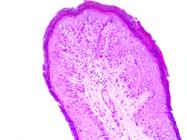ABSTRACT:
An outbreak of acute poisoning in cattle caused by the ingestion of Portulaca elatior occurred in the northeastern Brazil. The outbreak resulted from ingestion of the plant provided by the farmer. Four out of five cattle were poisoned and two died. Clinical signs included abdominal pain, muscle trembling, intense salivation, mild bloat and dehydration. The course of the disease ranged from 10 to 18 hours. Gross findings included dehydration, reddening of the mucosa of forestomachs, abomasum, and intestine, with ulcerations of the ruminal mucosa. The presence of Portulaca leaves in the rumen was noted in both cases. The main histologic lesions were superficial to full thickness degeneration and necrosis of the stratified epithelium lining the forestomachs, necrosis and inflammation of the intestinal mucosa, and lymphoid necrosis. The serum activities of AST and GGT and serum were within normal ranges. The diagnosis of poisoning associated with ingestion of P. elatior was based on the epidemiology, clinical signs and lesions. The lack of information about the toxicity of P. elatior was the main cause for the accident of poisoning.
INDEX TERMS:
Poisonous plants; Portulaca elatior; Portulacaceae; plant poisoning; disease of cattle; rumen; necrosis

 Thumbnail
Thumbnail
 Thumbnail
Thumbnail
 Thumbnail
Thumbnail
 Thumbnail
Thumbnail
 Thumbnail
Thumbnail




